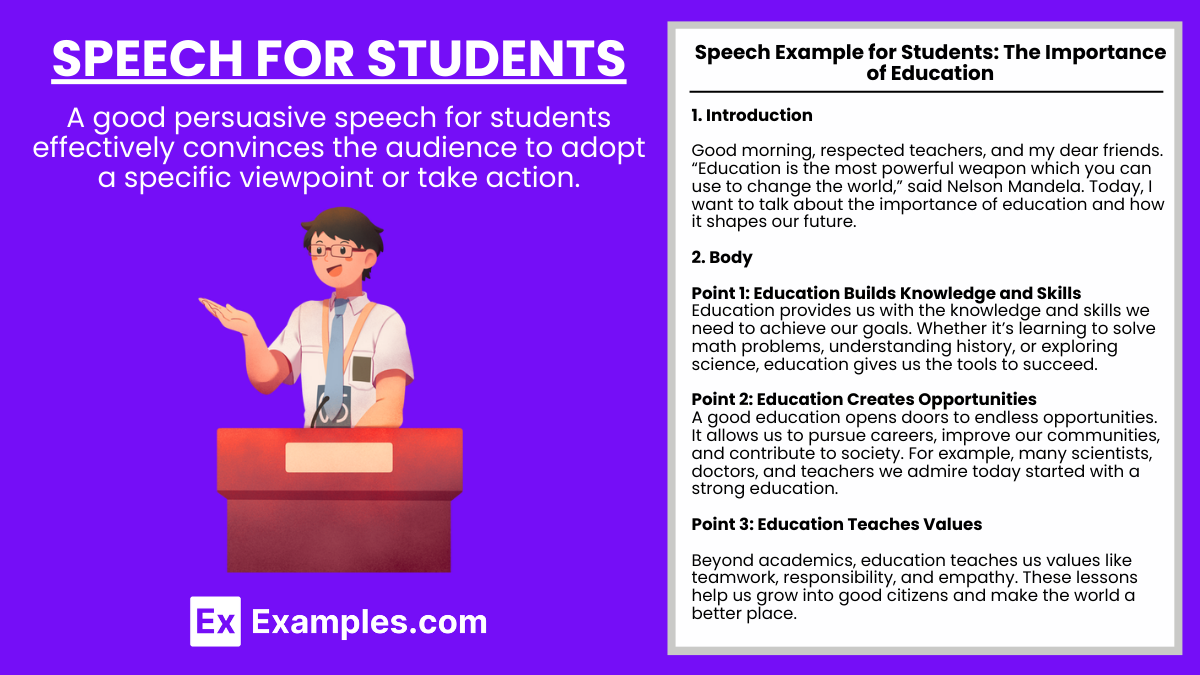10+ Speech for Students Examples to Download
A speech is a formal way of expressing ideas, opinions, or information to an audience. For students, learning what a speech is helps develop communication and public speaking skills. Speeches are powerful tools for sharing knowledge, inspiring others, and building confidence.
What is a Good Persuasive Speech for Students?
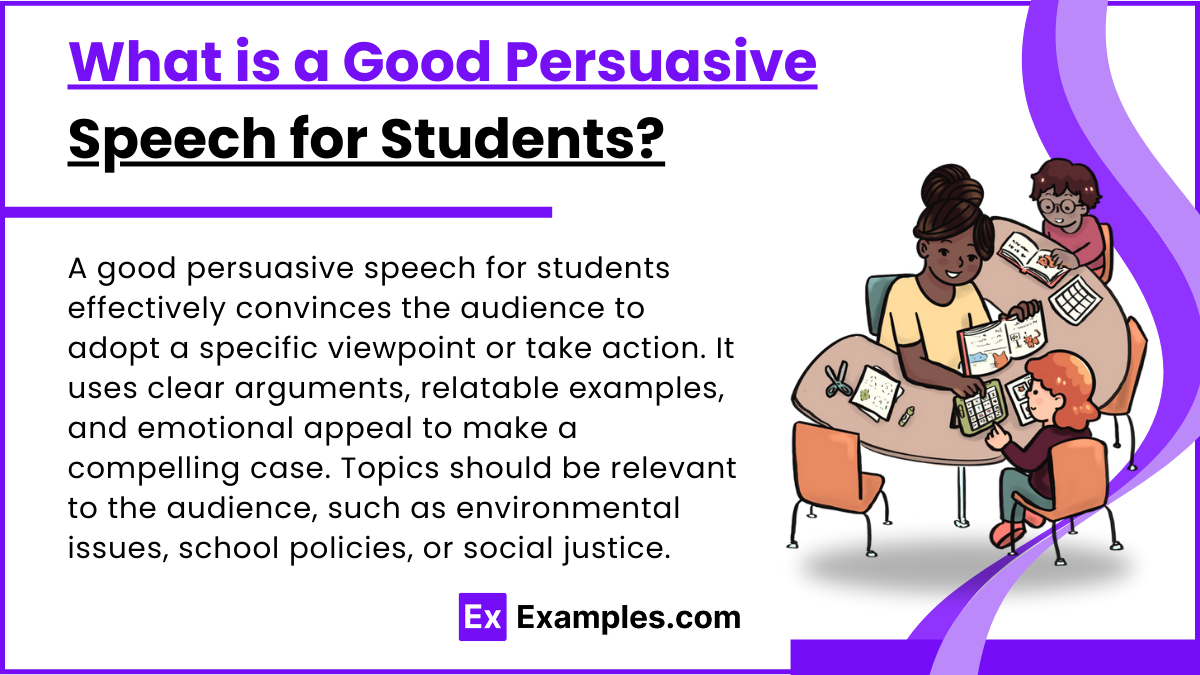
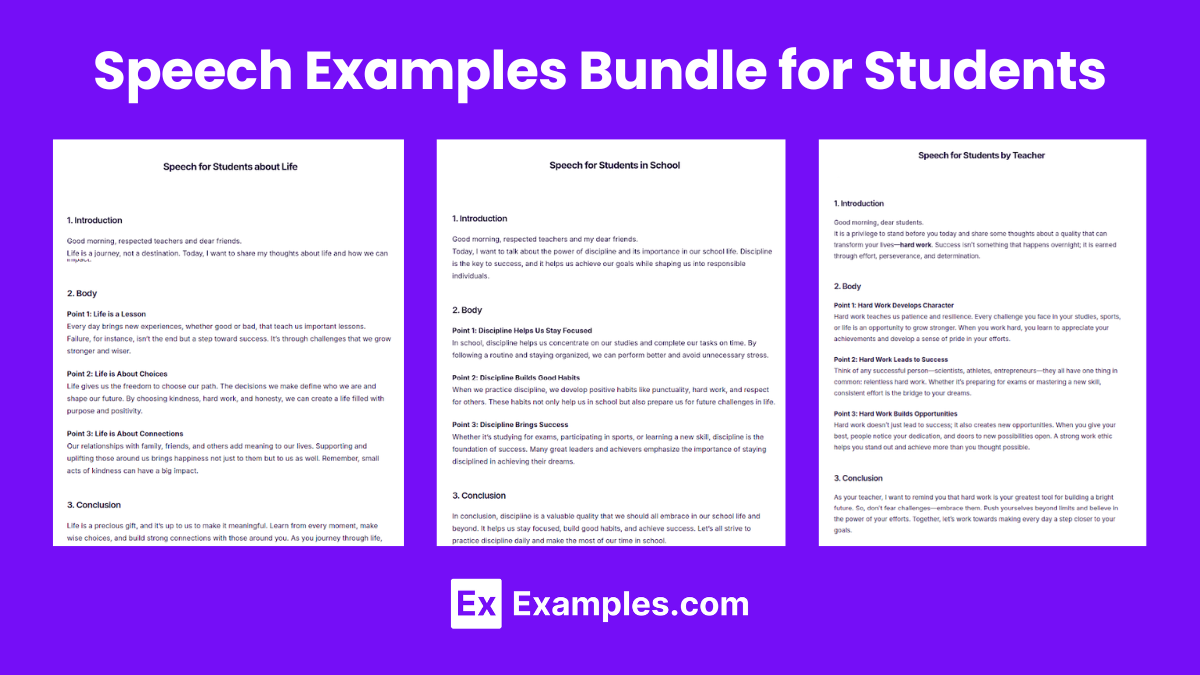
Download Speech Examples Bundle for Students
Speech for Students Format
Introduction
- Greeting: Start with a polite greeting (e.g., “Good morning, everyone” or “Respected teachers and dear friends”).
- Hook: Capture attention with a quote, question, or interesting fact.
- Purpose: Briefly state the topic and purpose of the speech.
Body
- Main Points: Present 2-3 key points supporting your topic.
- Use facts, examples, and personal anecdotes to strengthen your arguments.
- Transitions: Use smooth transitions to connect your points logically.Counterpoints (Optional): Address and refute opposing views if relevant.
Conclusion
- Summary: Recap the main points of your speech.
- Call to Action: End with an inspiring message or a call to action that encourages your audience to think or act.
- Thank You: Conclude politely by thanking the audience (e.g., “Thank you for your time and attention”).
Speech Example for Students: The Importance of Education
1. Introduction
Good morning, respected teachers, and my dear friends.
“Education is the most powerful weapon which you can use to change the world,” said Nelson Mandela. Today, I want to talk about the importance of education and how it shapes our future.2. Body
Point 1: Education Builds Knowledge and Skills
Education provides us with the knowledge and skills we need to achieve our goals. Whether it’s learning to solve math problems, understanding history, or exploring science, education gives us the tools to succeed.Point 2: Education Creates Opportunities
A good education opens doors to endless opportunities. It allows us to pursue careers, improve our communities, and contribute to society. For example, many scientists, doctors, and teachers we admire today started with a strong education.Point 3: Education Teaches Values
Beyond academics, education teaches us values like teamwork, responsibility, and empathy. These lessons help us grow into good citizens and make the world a better place.3. Conclusion
To sum up, education is the foundation of our personal and social development. It equips us with the knowledge, skills, and values to thrive in life. I encourage each of us to value our education and use it to create a brighter future for ourselves and others.
Speech for Students about Life
Students Speech for Independence Day
Edit & DownloadSpeech for Students in School
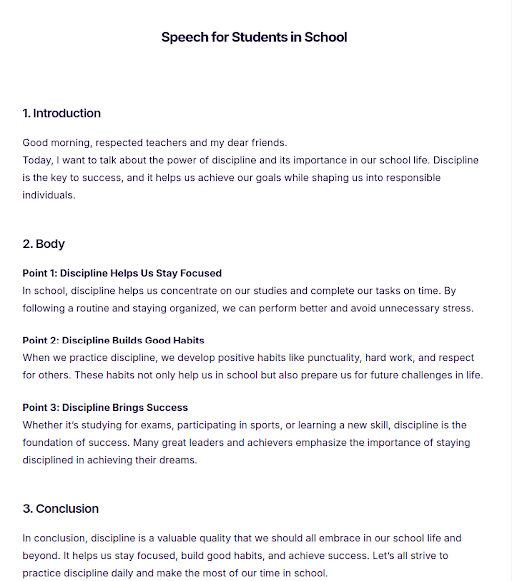
Speech for Students by Teacher
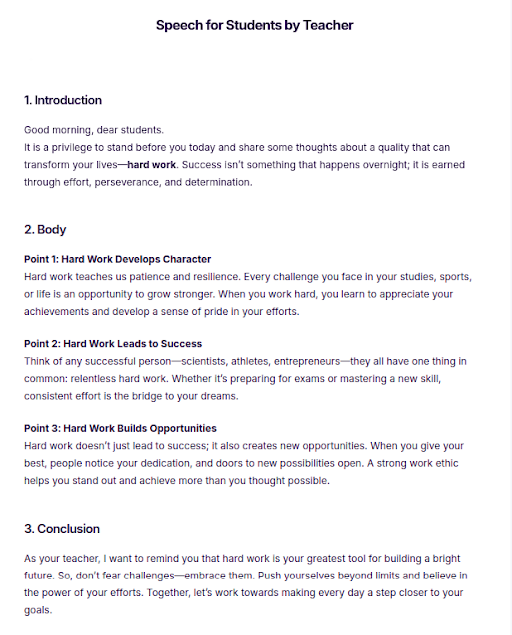
More Speech for Students Examples and samples
- Speech for Students on Teachers Day
- Speech for Students Motivation
- Speech for Students Council Election
- Speech for Students in Assembly
- Speech for Students Orientation
- Speech for Students on Children’s Day
- Inspirational Speech for Students
- Short Speech for Students
- 2 Minutes Speech for Students
- 1 Minute Speech for Students
- Persuasive Speech for Students
- Formal Speech for Students
- Students Speech for Independence Day
Student Council Speech
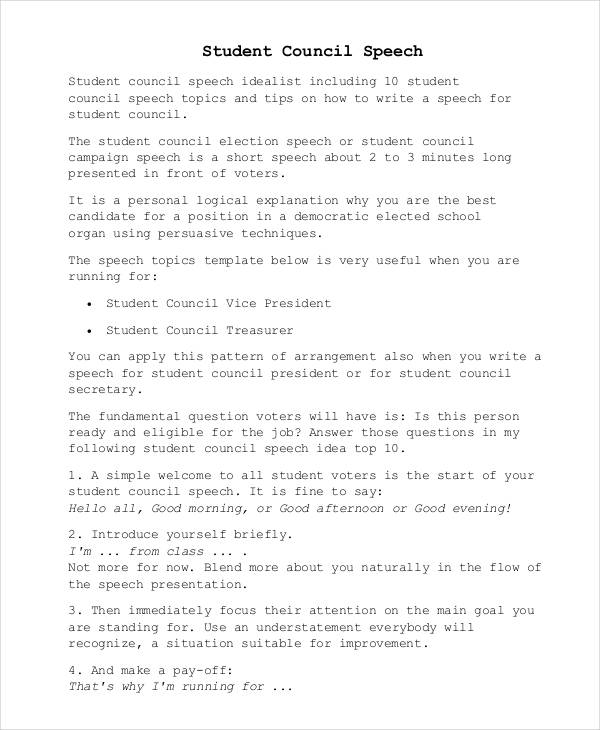
Short Speech for Students
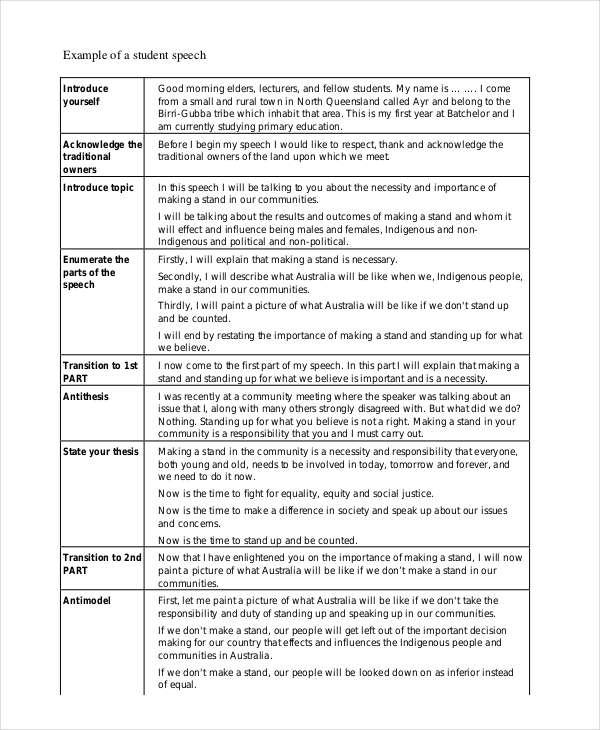
Student Farewell Speech
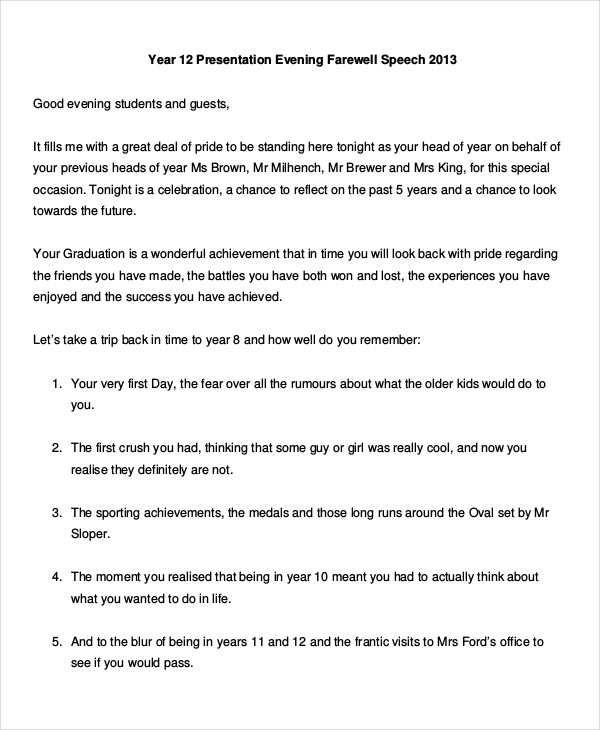
Student Award Example
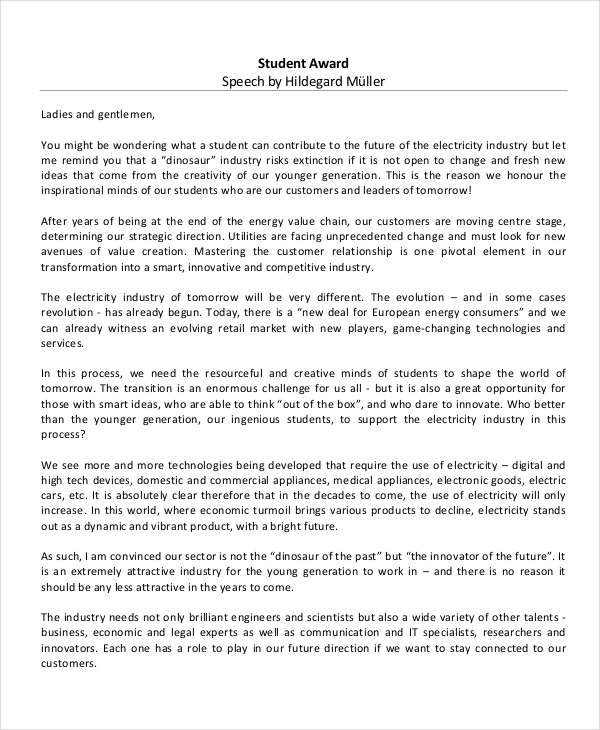
Graduation Speech
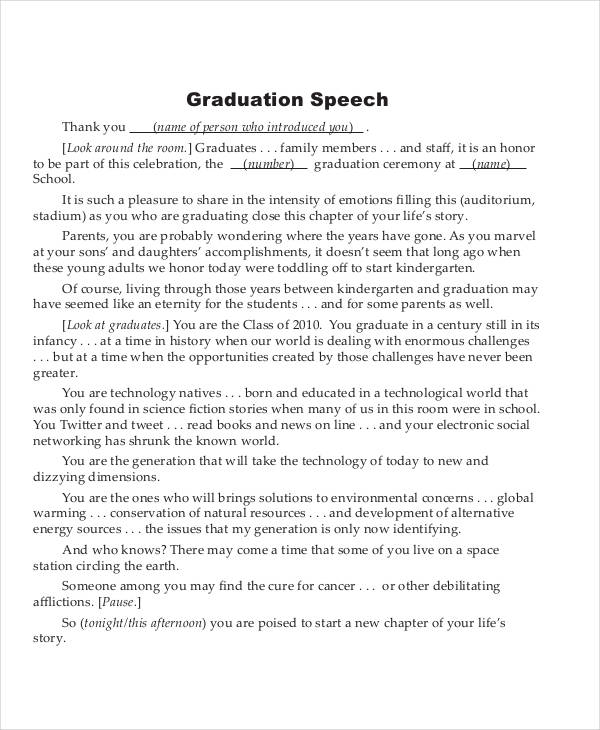
Inspirational Student Example

How to Conclude a Student Speech
Student speeches vary in type. Some can be inspiring, such as a graduation speech, while others are simply informative. But creating these types of speeches can be tough. You deliver the speech to a group that you encounter on a daily basis, the type of individuals whose attention span is said to be about 10 to 15 minutes long.
There are various speech examples that tell you how to start a speech but there isn’t much attention given on how to end it. It’s important to keep in mind that your last words will linger in the minds of your listeners making it your last opportunity to leave an impact. Here are a few ways for you to do so:
- Tell a brief story. It should illustrate the main points of your speech.
- Summarize key points. This is to remind your audience of the purpose of your speech. There might have been points that your listeners zoned out on, so it’s good to give them a brief run through of what was covered. You may also like steps in speech composition.
- A call to action. Presenting a challenge to an audience will always leave them thinking. Motivate them with encouraging words and a strong energy.
What are the benefits of listening to a motivational speech for students?
-
Inspiration and Encouragement: Motivational speeches inspire students to overcome challenges and aim for success.
-
Boost in Confidence: Encourages self-belief and helps students recognize their potential.
-
Clarity of Goals: Provides insights on setting and achieving personal and academic goals.
-
Positive Mindset: Helps students focus on solutions and develop resilience.
-
New Perspectives: Offers fresh ideas and different approaches to problem-solving and decision-making.
-
Enhanced Focus and Productivity: Motivates students to prioritize tasks and work harder toward their aspirations.
-
Improved Emotional Well-being: Addresses fears, doubts, and stress, fostering a sense of empowerment.
-
Life Skills Development: Teaches skills like perseverance, time management, and effective communication.
-
Sense of Community: Builds connection through shared experiences and stories of overcoming adversity.
-
Lasting Impact: Leaves students with a memorable message that continues to influence their actions.
Tips for Student Speech:
- Use simple and clear language.
- Maintain eye contact and engage your audience with gestures and expressions.
- Practice beforehand to improve delivery and confidence.
FAQs
How can students choose a good topic for a speech?
Students should select topics they are passionate about, are relatable to their audience, and provide opportunities for discussion, such as environmental awareness, mental health, or technology in education.
How do students structure a speech?
A speech typically includes:
Introduction: Greeting, hook, and purpose.
Body: Key points with supporting examples.
Conclusion: Summary, call to action, and thanks.
What are some common challenges students face while giving a speech?
Challenges include stage fright, forgetting key points, speaking too quickly, or losing audience interest. Practice and preparation can help overcome these issues.
How can students improve their public speaking skills?
Students can improve by practicing regularly, joining public speaking clubs (e.g., Toastmasters), seeking feedback from peers, and watching experienced speakers for inspiration.
How long should a student speech be?
The length of a student speech typically depends on the event but usually ranges from 3 to 5 minutes for classroom settings and up to 10 minutes for competitions or formal events.


